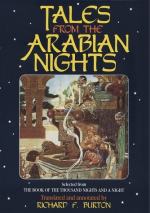P. 34.—In some versions of this story Harun’s abstention from his bride for a year is attributed to a previous vow.
P. 46 and note 4.—This passage, relative to the character of the Caliph, may be compared with his forgetfulness respecting Nur Al-Din Ali and Anis Al-Jalis. (Vol. ii. p, 42, and note.)
The Linguist-dame, the Duenna,
and the King’s Son (Pp.
69-87).
This story, though much shorter, is very closely paralleled by that of Prince Calaf and the Princess of China, in the Thousand and One Days (cf. vol. x., App, pp. 499, 500) Prince Calaf (the son of the King of the Nogais Tartars) and his parents are driven from their kingdom by the Sultan of Carizme (Khwarizm), and take refuge with the Khan of Berlas, where the old King and Queen remain, while Calaf proceeds to China, where he engages in an intellectual contest with Princess Tourandocte (Turandot, i.e. Turandokht or Turan’s daughter). When Turandot is on the point of defeat, she sends her confidante, a captive princess, to Calaf, to worm out his secret (his own name). The confidante, who is herself in love with Calaf, horrifies him with the invention that Turandot intends to have him secretly assassinated; but although he drops his name in his consternation, he refuses to fly with his visitor. In the morning Turandot declares Calaf’s name to him but comforts him by saying that she has nevertheless determined to accept him as her husband, instead of cutting off his head; and the slave princess commits suicide. Messengers are then sent for Calaf’s parents, who arrive in company with the friendly Khan who had granted them an asylum; and Calaf marches against the Sultan of Carizme, who is defeated and slain, when his subjects readily submit to the conqueror.
P. 77.—According to Jewish tradition, the Rod of Moses became transformed into so terrible a dragon that the Egyptians took to flight, and 60,000 of them were slain in the press.—(Sale’s Koran, chap. 7, note.)
P. 77, note 4.—It was long denied that ants store up grain, because our English ants do not; but it is now well known that many foreign species, some of which inhabit countries bordering on the Mediterranean (including Palestine), store up large quantities of grass seeds in their nests; and one ant found in North America is said to actually cultivate a particular kind of grass.
P. 81, note 6.—Those interested in the question of the succession of the Patriarchs may refer to Joseph Jacobs’ article on “Junior-right in Genesis,"[FN#430] in which the writer argues that it was the original custom among the Hebrews, as among other nations, for the youngest son to succeed to his father’s estates, after the elder ones had already established themselves elsewhere. Much may be urged in favour of this writer’s conclusions, and it will be remembered that our own Monarchy was not recognised as hereditary until the time of the Conquest, the most able or the strongest relative of the late King usually succeeding to the Crown, and minors being always set aside, unless powerful politicians intended to use them as mere tools. In the Esthonian Kalevipoeg the system comes out still more strongly. Three sons are living at home at the time of the death of Kalev, but the youngest is designated by him as his successor, and is afterwards indicated by lot as the peculiar favourite of the gods.




